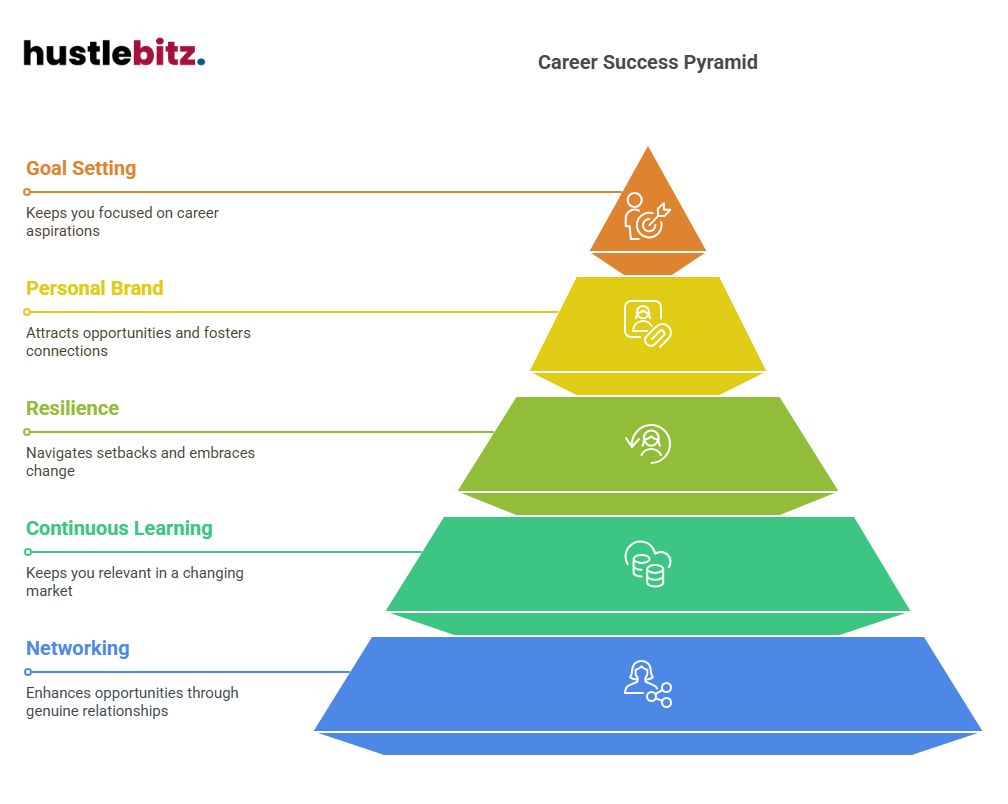Long-term career success hinges on several key strategies. First, embrace the power of networking to build valuable relationships that facilitate growth and opportunities. Next, invest in continuous learning to adapt to changing industry demands and enhance your skill set. Flexibility and adaptability are crucial in navigating challenges and maintaining resilience. Additionally, crafting a compelling personal brand allows you to showcase your unique strengths and values effectively. Finally, fostering persistence and a positive mindset will support your journey through setbacks. Exploring these strategies further can unlock more insights to accelerate your career trajectory.
Key Takeaways
- Building a strong professional network enhances opportunities and facilitates growth through genuine relationships and effective communication.
- Continuous learning through courses, certifications, and mentorship keeps you relevant and adaptable in a changing job market.
- Cultivating resilience and adaptability allows you to navigate setbacks and embrace change as essential for long-term success.
- Establishing a compelling personal brand and maintaining authenticity attract better career opportunities and foster lasting connections.
- Setting SMART goals and regularly assessing progress keeps you focused and motivated on the path to achieving long-term career aspirations.

Lesson 1: Embrace the Power of Networking

Networking is an essential foundation for long-term career success, as it cultivates valuable relationships that can open doors to opportunities and foster professional growth. By implementing effective networking strategies, individuals can enhance their ability to build meaningful relationships that lead to mentorship opportunities and professional connections. Engaging in networking events, whether in-person or online, provides a platform to meet industry leaders, peers, and potential collaborators.
To maximize the benefits of networking, effective communication is vital. Articulating your goals and interests clearly fosters genuine interactions, allowing others to understand how they can assist you. Additionally, following up with individuals after initial meetings is crucial; employing follow-up techniques, such as sending personalized messages, reinforces connections and demonstrates appreciation for their time.
Building trust is a cornerstone of successful networking. By being authentic and reliable, you create a foundation for long-lasting relationships. Leveraging networks effectively means not only seeking support but also being willing to offer assistance to others, creating a reciprocal environment that enhances overall career development.
In today’s digital age, online networking has become increasingly important. Platforms like LinkedIn provide opportunities to connect with professionals across different sectors, broadening your reach and influence. By embracing these networking strategies, you position yourself to seize opportunities that can propel your career forward, underscoring the profound impact of networking on your long-term success.
Lesson 2: Invest in Continuous Learning

Building on the foundation of meaningful relationships established through networking, investing in continuous learning is vital for adapting to the ever-evolving demands of the professional landscape. In today’s fast-paced environment, professionals must commit to ongoing skill development to remain competitive. Online courses have emerged as accessible learning resources, allowing individuals to acquire new competencies that align with current industry trends.
Engaging in professional certifications not only enhances one’s resume but also demonstrates a commitment to personal growth. These credentials can set you apart in a crowded job market and signal to employers that you are proactive about your career advancement. Additionally, mentorship opportunities provide invaluable insights, offering guidance from seasoned professionals who can share their experiences and feedback mechanisms for improvement.
To maximize the benefits of continuous learning, it is essential to adopt a structured approach to goal setting. Establish specific learning objectives to ensure that your efforts are focused and measurable. This can involve identifying areas for improvement or new skills to acquire in line with market demands.
Furthermore, knowledge sharing within your professional network can enrich your learning experience. Collaborating with peers fosters a culture of growth and exposes you to diverse perspectives. By integrating these strategies into your career development plan, you not only enhance your expertise but also position yourself as a dynamic professional ready to meet the challenges of an ever-changing work environment.
Lesson 3: Be Flexible and Adapt Quickly
Embracing flexibility and adapting quickly to change are essential skills for navigating the complexities of today’s professional landscape. In an era marked by rapid technological advancements and shifting market dynamics, career agility becomes a vital asset. Professionals must hone their adaptability skills to not only survive but thrive amidst uncertainty. This involves effective change management and resilience building, enabling individuals to recognize opportunities where others see challenges.
Adapting to change often requires mindset shifts and strategic pivots. Developing an innovation mindset allows professionals to approach problems creatively, while feedback incorporation provides the insights needed for continuous improvement. Embracing uncertainty can be daunting; however, those who master this skill can leverage it to foster growth and seize new opportunities.
To illustrate these concepts, consider the following framework:
| Key Concept | Description | Action Item |
| Career Agility | The ability to swiftly navigate career changes | Regularly assess career goals |
| Adaptability Skills | Skills that allow for effective response to change | Engage in diverse experiences |
| Resilience Building | Developing the capacity to recover from setbacks | Practice stress management techniques |
Lesson 4: Craft a Compelling Personal Brand

In a rapidly changing professional landscape, establishing a compelling personal brand is fundamental for standing out and effectively communicating one’s unique value proposition. A strong personal brand not only reflects your personal values and unique strengths but also fosters professional authenticity. By crafting a narrative that resonates with your target audience, you can enhance your reputation and build lasting connections.
To effectively craft your personal brand, consider the following strategies:
- Define Your Core Values: Identify the personal values that guide your professional life. These values will serve as the foundation of your brand and resonate with like-minded individuals.
- Develop Storytelling Skills: Utilize storytelling to convey your professional journey, achievements, and lessons learned. A well-crafted narrative can captivate your audience and facilitate deeper engagement.
- Enhance Your Online Presence: Leverage social media and professional platforms to showcase your expertise. Ensure your visual identity and content are consistent across all channels, reinforcing your brand message.
- Master Your Elevator Pitch: Prepare a concise and compelling elevator pitch that encapsulates your brand. This pitch should reflect your unique strengths and serve as a powerful tool for networking.
Lesson 5: Stay Persistent and Stay Positive
Persistence and a positive mindset are essential components for navigating the inevitable challenges and setbacks encountered throughout one’s career journey.
Developing resilience training can equip individuals with the tools necessary to overcome obstacles and adapt to changing circumstances. This approach not only fosters a robust professional demeanor but also encourages the cultivation of success habits that contribute to long-term goals.
Mindset shifts play a crucial role in maintaining a positive outlook. By embracing motivational strategies like positive affirmations, professionals can reinforce their self-belief and bolster their confidence, even in the face of adversity. Such affirmations serve as a daily reminder of one’s capabilities and aspirations, enabling individuals to navigate their paths with determination.
Incorporating a gratitude practice into daily routines can further enhance one’s perspective, allowing for a greater appreciation of achievements and lessons learned along the way. This simple yet powerful exercise aids in stress management, transforming negative experiences into opportunities for growth and self-reflection.
Ultimately, maintaining persistence and positivity is not merely about enduring hardships; it is about thriving despite them. By consciously adopting these strategies, professionals align themselves with a mindset conducive to long-term success.
As challenges arise, those who practice resilience and positivity will find themselves better equipped to navigate the complexities of their careers, emerging stronger and more focused on achieving their goals.
Final Thoughts
Achieving long-term career success requires a combination of building relationships, continuous learning, adaptability, and personal branding. By networking effectively, staying flexible, and committing to lifelong learning, you position yourself for ongoing growth in an ever-changing professional landscape. Additionally, maintaining persistence and a positive mindset will help you navigate challenges and setbacks with resilience. These strategies create a strong foundation for sustainable career success, ensuring that you continue to evolve and seize new opportunities as they arise. Remember, your career journey is a marathon, not a sprint—so stay focused, adaptable, and always keep learning.




